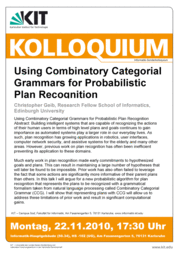Using Combinatory Categorial Grammars for Probabilistic Plan Recognition
Building intelligent systems that are capable of recognizing the actions of their human users in terms of high level plans and goals continues to gain importance as automated systems play a larger role in our everyday lives. As such, plan recognition has growing applications in robotics, user interfaces, computer network security, and assistive systems for the elderly and many other areas. However, previous work on plan recognition has often been inefficient preventing its application to these domains. Much early work in plan recognition made early commitments to hypothesized goals and plans.
This can result in maintaining a large number of hypotheses that will later be found to be impossible. Prior work has also often failed to leverage the fact that some actions are significantly more informative of their parent plans than others. In this talk I will argue for a new probabilistic algorithm for plan recognition that represents the plans to be recognized with a grammatical formalism taken from natural language processing called Combinatory Categorial Grammar (CCG). I will show that representing plans with CCG will allow us to address these limitations of prior work and result in significant computational gains.
Bio: Christopher Geib is a Research Fellow at the University of Edinburgh School of Informatics. Prior to moving to Edinburgh, he spent nine years as a Senior Research Scientist at the Honeywell Technology Center. He holds a M.S. and Ph.D. from the University of Pennsylvania. His research focuses broadly on decision making and reasoning about actions under conditions of uncertainty including planning, scheduling, constraint based reasoning, human computer and robot interaction, and probabilistic reasoning. His recent research has focused on probabilistic intent recognition and planning based on formal grammatical systems.
